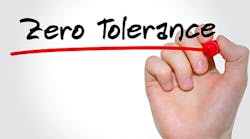In the months since the #MeToo movement began last year, many employers have chosen to adopt a “zero tolerance” approach to sexual harassment—get caught doing it and you are fired. But voices argue that this policy is too extreme and can even be counterproductive.
"Zero tolerance is too blunt an instrument, and it may even increase bad behavior,” warns Robin Shea, partner in the law firm of Constangy Brooks Smith & Prophete LLP. “By all means prohibit harassment, dishonesty and violence (and other bad acts), but don’t have zero tolerance policies,” she advises.
She’s in good company with her views. Chai Feldblum, a prominent Democrat member of the Equal Employment Opportunity Commission, also believes that zero tolerance policies can actually make it harder for employers to fight workplace harassment. A zero tolerance policy “will not only be correctly perceived as an unfair system, but it might also chill reporting,” Feldblum says. “A lot of people don’t want their co-worker to be fired, they just want the conduct to stop.”
She understands the intent. “A lot of people like to use the term ‘zero-tolerance policy,’” Feldblum notes. “What we like about that term is that it communicates that there will be zero tolerance for any form of unwelcome behavior in the workplace. The whole point is that you’re nipping bad behavior in the bud. An employee should understand that it does not mean that every type of conduct results in the same consequence, for example, termination."
Shea would go further than the EEOC commissioner. While she agrees with Feldblum when it comes to zero tolerance policies in the context of sexual harassment, Shea also believes they should be avoided in the context of policies that deal with workplace violence or any other type of employee misconduct.
By creating zero tolerance for violations of workplace policies, you are telling employees that certain behaviors will automatically result in firing every time they are violated, Shea argues. “Yes, harassment, threats, violent behavior and other misconduct should not be tolerated, but you don’t have to go nuclear in every case.”
Howard Mavity, an attorney with the law firm of Fisher Phillips, says he and other lawyers agree. “You’d be hard pressed to find many management-side employment lawyers who favor broad use of zero tolerance policies, and from what I can tell, the employee-side lawyers have about as many concerns as do we.”
He agrees that no company should tolerate unlawful harassment, dishonesty, workplace violence, bullying, or discrimination. “However, having a zero or ‘no’ tolerance for such behavior does not have to mean that any prescribed act automatically triggers dismissal—that’s the problem,” Mavity explains.
What You Should Do
Other attorneys also agree that zero tolerance for sexual harassment should only mean that your company leadership and culture do not permit it in any form, not that termination is the answer to every reported incident. In fact, the only way to make sure sexual harassment does not rear its ugly head is to make the policy against it clear and unequivocal.
For an example of how zero tolerance in punishment can go wrong, Shea suggests mulling the potential case of an employee who has been with your firm for many years, with a good record and no prior issues. One day this person tells a relatively innocuous off-color joke to a couple of co-workers, and one of them later complains. “Would you fire the employee who told the joke? I wouldn't,” she offers.
Shea points out that if co-workers are afraid that the employee who made a little joke in bad taste is going to get fired, they are probably not going to say a word about it—but if nothing is done about the joker, there’s a chance that he may begin to feel free to tell more inappropriate jokes. “And the ‘innocuous’ inappropriate jokes may even escalate to obscene jokes that are told to a wider circle of employees. And next thing you know, you have a real mess on your hands,” Shea says.
This also can be the result if management end up “pulling its punches” when deciding sexual harassment allegations and refusing to recognize bad behavior because the consequences are all out of proportion to the policy violations.
Speaking of punches, even workplace violence situations can sometimes be nuanced, Shea says. What if an employee makes an unwanted sexual pass at another employee, and she shoves him, trying to push him away? A shove is “violence,” isn’t it? Or what if she tells him, “If you ever try that again, I’ll smack you silly.” That's a threat. Do John and Mary both get fired? Good luck firing an employee who was trying to defend herself against a sexual assault, she states.
This is where I disagree with Shea. I think that you can—and should—have a zero tolerance policy towards violence. Just make sure that you don’t end up defining workplace violence as liberally as she does.
However, I agree with her about sexual harassment. If you must call your policy zero tolerance, she urges that you make it clear that all allegations of behavior violating your harassment policy will be thoroughly investigated—which means that you won’t automatically assume the accused employee is guilty. Also make clear that if the accusations are confirmed, the employee “will be subject to disciplinary action up to and including termination of employment, depending on the circumstances and the severity of the conduct, as well as other factors.”
Shea concludes, “A policy like this will communicate to employees that you will not use an atomic bomb to kill a gnat.”




